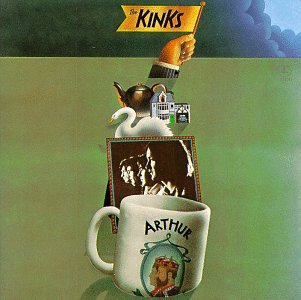Arthur
 With Prince William announcing his engagement and people simulating interest in the British royal family, it seemed like a good time to roll out another of my “Rolling Stone Hall of Fame” entries, this one a four-star review for the Kinks’ Arthur (not to be confused with Christopher Cross’s tribute to getting caught between the moon and New York City).
With Prince William announcing his engagement and people simulating interest in the British royal family, it seemed like a good time to roll out another of my “Rolling Stone Hall of Fame” entries, this one a four-star review for the Kinks’ Arthur (not to be confused with Christopher Cross’s tribute to getting caught between the moon and New York City).
The Kinks, Arthur or The Decline and Fall of the British Empire (1969)
Thrill to the searing, pulse-pounding drama of Arthur! A man grows up in England, doesn’t get killed in World War II, emigrates to Australia, and lives out his life in the suburbs! Upon its release, the Kinks’ seventh studio album was considered a pale imitation of the Who’s rock opera Tommy, which debuted earlier the same year–but now Arthur sounds like a quiet masterpiece. On commission from England’s Granada TV, Ray Davies wrote a musical, a fictionalized biography of his brother-in-law; due to budget cuts, it was never filmed. What remained were twelve songs that summed up Davies’ lyrical obsessions: Britannia and the subjects who lived underneath her gray skies.
Davies’ tunes are spilling over with ideas and melodies–and on the waltz “She Bought a Hat Like Princess Marina,” even sound effects from car horns and kazoos. The excellent “Australia” starts off as a catchy jingle (“Opportunities are available in all walks of life in Australia!”), and somehow turns into a psychedelic jam. The two best songs on the album are written from converse perspectives: “Victoria” is a rowdy tribute to the austere nineteenth-century queen and the colonies she presided over. The melancholy “Shangri-La,” on the other hand, the portrait of a modern man and the dominion he presides over: a fireplace, a rocking chair, and a TV set. The tone throughout is bittersweet, and filled with sympathy for the blinkered middle class.
As it turned out, Arthur was a valedictory not just for the British empire, but for the Kinks’ run of elegant ’60s albums. The following year, they would release “Lola,” a huge hit, the gateway to American arena tours–and the beginning of a long period where the band traded civilized subtlety for crass success.
(By Gavin Edwards. Originally published in Rolling Stone 917 (March 16, 2003).)
I was curious about the original Rolling Stone review of the album; it turns out that there were two. A short and elegant one by Greil Marcus pondered the Kinks’ relationship to British culture (“Christine Keeler died for their sins”). Mike Daly wrote a long track-by-track exegesis, which in passing mentioned this amazing fact: at the time (1969), the Kinks’ previous two albums, Something Else and The Village Green Preservation Society, stone-cold classics both, had sold a combined total of 25,000 copies in the United States.
posted 16 November 2010 in Reviews and tagged Kinks, RSHOF. 4 comments



November 16th, 2010 at 12:51 pm
Arthur has become my favorite of the Kinks albums, even more than Village Green. And my god, it was certainly better than the overblown Tommy (imgdo).
November 19th, 2010 at 1:18 pm
“Some of it was brilliant and some of it was crap, as with all Kinks albums, which shouldn’t have made any difference one way or the other. But an extraordinary push by two “Rolling Stone” reviewers (one of whom, I confess, was me), and its release at the same time as the Who’s “Tommy” (suddenly nothing was as salable as the concept of Opera, which is to say, Art) made “Arthur” a decent success.”– Greil Marcus in “Mystery Train,” 1975
the “Christine Keeler” line is really great! so is your Christopher Cross comparison.
November 19th, 2010 at 2:30 pm
I just regret that the Kinks never recorded Arthur 2: On the Rocks.
November 24th, 2010 at 11:56 am
I had this on in the car yesterday when I went to pick up Jack from school. He hadn’t heard it before, and didn’t say anything about it, but as soon as we got home, he took it up to his computer to download it onto his iTunes.